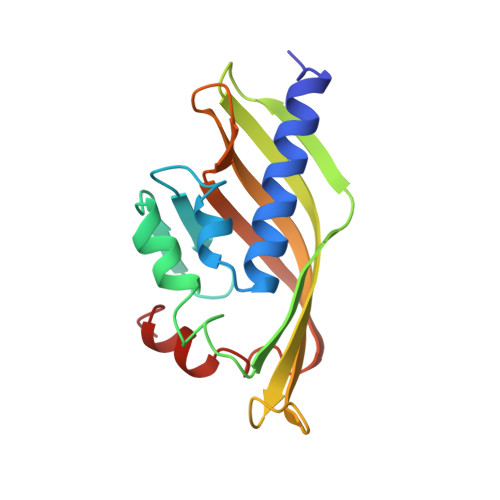High-resolution structures of scytalone dehydratase-inhibitor complexes crystallized at physiological pH.
Wawrzak, Z., Sandalova, T., Steffens, J.J., Basarab, G.S., Lundqvist, T., Lindqvist, Y., Jordan, D.B.(1999) Proteins 35: 425-439
- PubMed: 10382670
- DOI: https://doi.org/10.1002/(sici)1097-0134(19990601)35:4<425::aid-prot6>3.0.co;2-1
- Primary Citation of Related Structures:
4STD, 5STD, 6STD, 7STD - PubMed Abstract:
Scytalone dehydratase is a molecular target of inhibitor design efforts aimed at preventing the fungal disease caused by Magnaporthe grisea. A method for cocrystallization of enzyme with inhibitors at neutral pH has produced several crystal structures of enzyme-inhibitor complexes at resolutions ranging from 1.5 to 2.2 A. Four high resolution structures of different enzyme-inhibitor complexes are described. In contrast to the original X-ray structure of the enzyme, the four new structures have well-defined electron density for the loop region comprising residues 115-119 and a different conformation between residues 154 and 160. The structure of the enzyme complex with an aminoquinazoline inhibitor showed that the inhibitor is in a position to form a hydrogen bond with the amide of the Asn131 side chain and with two water molecules in a fashion similar to the salicylamide inhibitor in the original structure, thus confirming design principles. The aminoquinazoline structure also allows for a more confident assignment of donors and acceptors in the hydrogen bonding network. The structures of the enzyme complexes with two dichlorocyclopropane carboxamide inhibitors showed the two chlorine atoms nearly in plane with the amide side chain of Asn131. The positions of Phe53 and Phe158 are significantly altered in the new structures in comparison to the two structures obtained from crystals grown at acidic pH. The multiple structures help define the mobility of active site amino acids critical for catalysis and inhibitor binding.
Organizational Affiliation:
E.I. DuPont de Nemours Life Sciences, Experimental Station, Wilmington, Delaware, USA.















